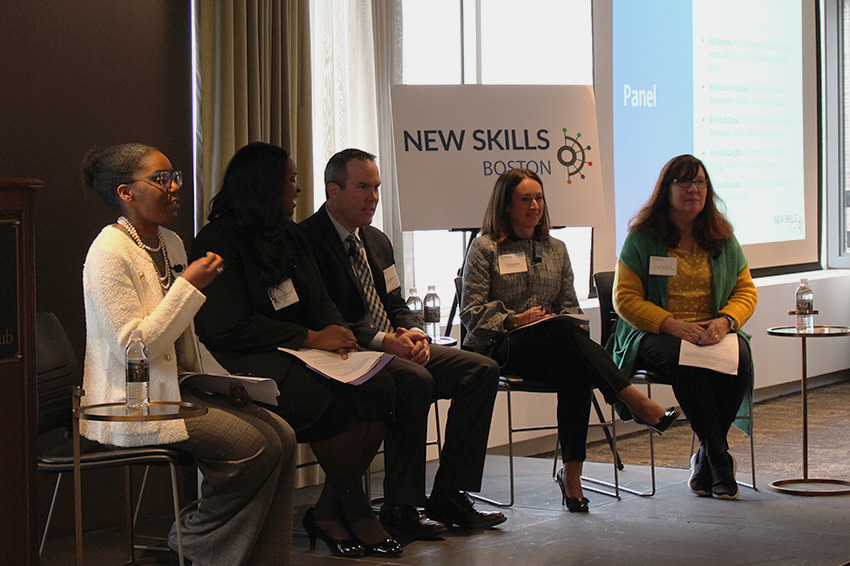Research & Insights / A systematic approach to equitable career pathways in Boston
A systematic approach to equitable career pathways in Boston

At our December 6th briefing on New Skills Boston, energy and enthusiasm was shared among partners and supporters of equitable career pathways. Marinell Rousmaniere, CEO of EdVestors, opened the conversation with an overview of New Skills Boston, highlighting the commitment and engagement of 8 cross-sector partners to launch and continue this work amidst the pandemic.
LaVonia Montouté, EdVestors Director of Career Pathways, facilitated the discussion on New Skills Boston’s work in the past two plus years and the next steps and opportunities needed to sustain it with New Skills Boston education and workforce partners:
- Liya Escalera, Ph.D., Vice Provost for Student Equity, Access, and Success, University of Massachusetts Boston
- Kristen McKenna, Dean of Workforce and Economic Development, Bunker Hill Community College
- Marsha Innis Mitchell, Executive Director of Postsecondary Initiatives, Boston Public Schools, and
- Joseph McLaughlin, Director of Research and Strategy, Boston Private Industry Council.
The panelists shared their experiences in engaging with the New Skills Boston effort where they’ve aimed to increase participation in engaging and relevant, and equitable career pathways and career preparation among Black, Latinx, special education, and English Learner students. This has aligned with milestone achievements, such as the expansion of MyCAP access to all Boston Public Schools students in grades 6-12.
The conversation also raised important insights and questions about the future of career learning in Boston. Below are a few key takeaways:
New Skills Boston builds on existing work
Joseph McLaughlin likened the work-based learning landscape in Boston before New Skills Boston to a recent headline on the Boston Patriots’. He said, "We had a lot of plays but no system.”
Liya Escalera said, “I value that New Skills Boston has integrated a lot of existing work. We had made some progress but we hadn't looked at a system-level approach yet. This has allowed us to get to root causes and that has made it exceptional." A key hallmark of the work since 2020 has been the ability to continue deep partnerships across postsecondary to support seamless transitions. This work builds of the knowledge of a previous effort through the Lumina Talent Hub.
Similarly New Skills Boston aligns and coordinates with existing career exploration and college completion efforts through Generation Success and Success Boston respectively. Panelists shared how the shared synergy across enabled the work and partnerships to be more effective.
Making transitions for students more seamless
One key result from these coordinated efforts is the ability to create more seamless transitions for students between education institutions. LaVonia Montouté articulated the benefit of these efforts to address the “leaky pipeline” created by roadblocks in institutional systems that can derail students, especially Black and Latinx students, multilingual learners, and students with disabilities.
“We design these pathways but don't consider how students get on and off,” Kristen McKenna added.
New Skills Boston has supported continued collaboration between Bunker Hill Community College and the University of Massachusetts-Boston, resulting in a better understanding of the student experience.
Lessening the friction in these transitions can build momentum and motivate students to continue in their program. McKenna stressed the necessity of pathway flexibility to accommodate major life changes.
And while some easy fixes have been made, such as streamlining the credit transfer process, Escalera looks forward to a system where these interventions are unnecessary. "We have to have one eye on the ground and one eye on the future," she said.
Sustaining New Skills Boston
Throughout the morning, remarks reflected a theme of equity minded practices. When asked how this work can be sustained to ensure equitable student outcomes, panelists pointed to continued investment in capacity alongside institutional commitment and district leadership.
Along with institutional commitment and district leadership, continued investment in capacity will maintain the momentum New Skills Boston has started.
“Magic happens on the frontlines,” Innis Mitchell said. The impact of coordinators who enable deeper collaboration with partners and students cannot be underestimated.
Escalera also emphasized a need to focus on postsecondary completion. Data shows that students who don’t complete their postsecondary education are more likely to face financial instability than students who never started at all. “Completing our degrees is the most important thing,” she said.
New Skills Boston will continue work to implement equitable career pathways, focus on advising, and support student transitions and work-based learning. With around 150 new students enrolled in industry-aligned pathways to date as a result of New Skills Boston, new pathways coming on each year, and strengthening of existing pathways, Innis Mitchell believes Boston is on the trajectory to double the number of Boston Public Schools students in pathways.
Heather Johnson, EdVestors Vice President of Programs, Strategy & Impact, closed the briefing saying that each person in the room, including postsecondary, community, and philanthropic members and employers, have a role to play. Transformational partnerships, leadership, and expertise are key factors that will give Boston students opportunities to explore, make informed decisions, and navigate towards a future where they are thriving in ways that are meaningful to them.



